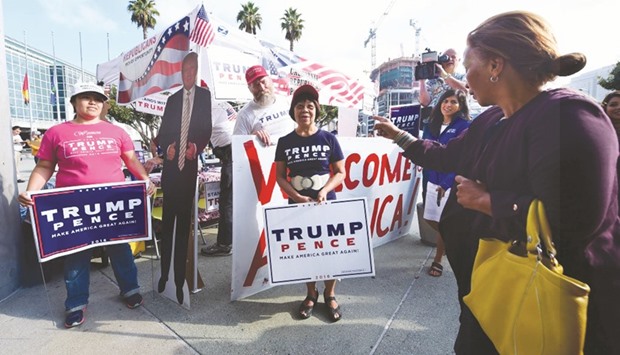Record numbers of Latinos have registered to vote this year, giving them unprecedented power to influence the US presidential election on November 8. But will they actually vote?
Pundits have long described the Latino vote as a “sleeping giant” because turnout in the community has historically been low.
With the polarising figure of Donald Trump on the ballot this year, however, that may finally change.
The Republican presidential candidate opened his campaign denigrating Mexican immigrants as drug dealers, criminals and rapists, allowing that only “some, I assume, are good people”.
He later vowed to deport the 11mn undocumented immigrants living in the country - overwhelmingly of Latino origin - and build a wall on the US border with Mexico.
In his final televised debate with his rival last Wednesday, Democrat Hillary Clinton, he warned about “some bad hombres here”, unleashing a flood of Internet outrage and mocking memes.
Still, Trump does have some Latino support. In a recent Pew Research Center survey, 19% of respondents said they plan to vote for bombastic real estate billionaire. Clinton has the lion’s share of support, however, with 58%.
“This year, we will have a record number of Hispanic voters - there are 4mn new voters,” Pew’s director of Hispanic research, Mark Hugo Lopez, said.
“But will there be a ‘Trump effect,’ in that more voters will cast ballots against the candidate?” he added. “We don’t know yet.”
Latino voters have a strong presence in three of the seven swing states in this election cycle: Arizona (22%), Florida (18%) and Nevada (17%).
But more than half - 52 % - live in solidly Democratic states such as California and New York, or solidly Republican states like Texas.
Therefore “it’s not probable that the Latino vote will be decisive,” Lopez said.
Among the minority of Trump supporters, Marco Gutierrez - founder of the Latinos For Trump group - enjoyed his 15 minutes of fame when he warned in a TV interview that without Trump’s border wall, there will be “taco trucks on every corner”.
The resulting firestorm and online mockery led the Trump campaign to ask him to not make his support official, the 42 year-old Mexican American activist told AFP, speaking from his California home.
In the New York City neighbourhood of Jackson Heights, where the aroma of tortillas, cilantro and roast meat wafts onto the sidewalks, taco vendors are humoured and thrilled by the idea.
“A taco truck on every corner? I sure hope for it!” said Delfino Sanchez, 58, who works at the Taqueria Coatzingo.
Mexican-born Araceli Dacoepien Damian, who sells tacos from a street cart, believes Trump is clueless.
“Trump doesn’t have any idea how much Mexicans suffer in our country, with no work and miserable pay,” said Damian, 23.
“Here, we work 12, 14 hours to survive, just to maintain the family that we left behind,” said Araceli, mother of an infant boy.
Latino Trump supporters are most likely to be US-born men who speak English, have some college education and are Protestant Evangelicals, according to the Pew poll.
Many approve of the former reality TV star’s hard line against the leftist regimes in Cuba and Venezuela.
“I’m not a racist,” Gutierrez said. “Immigrants can come, but legally. I support Trump because of the experience he has that would help the economy.”
The irony is that Gutierrez was an undocumented immigrant himself before he became a US citizen in 2003.
Another Trump supporter, Denise Galvez - a Miami-born Cuban-American who co-founded the group “Latinas for Trump” - says she likes what she sees as the candidate’s independent streak.
“He’s not a politician, he hasn’t been bought,” said Galvez, 41, who describes herself on Twitter as a “PR and marketing gal”.
Trump is “a businessman, and they know how to use common sense more than politicians to make difficult decisions,” she said.
Her support has withstood Trump’s history of lewd remarks, boasts about groping women, and accusations against him of sexual assault.
“The way to keep the good immigrants who want to work, you first have to kick out the criminals,” she said.
Such support for Trump, Pew’s Lopez believes, reflects the Latino community’s diversity.
“Not everyone is an immigrant and not everyone is Mexican.”

A woman lecturing Trump supporters as volunteers and supporters of Republican presidential candidate Donald Trump and Democratic presidential candidate Hillary Clinton were on hand outside the Los Angeles Convention Center to greet and help recruit new voters following their Naturalisation Ceremony in Los Angeles, California, last week.
